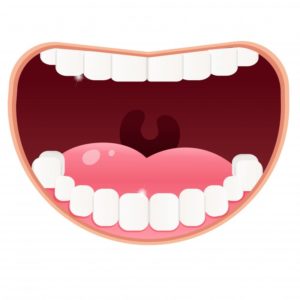
The better you understand something in life, generally the more it will matter to you. When the subject of this notion is something that can make your quality of life better, it sure makes a lot of sense to learn more.
On that note, when the word “mouth” is mentioned, you probably think of teeth and the tongue. But that’s just the tip of the iceberg. Keep reading to learn about the parts of the mouth and the role each one plays for your oral health from your dentist in Stephens City.
Your Salivary Glands, Gums, and Alveolar Bone Help Your Teeth
You have six salivary glands that produce the clear liquid known as saliva, which is made up predominantly of water and contains substances that break down food to begin the digestive process. Saliva also moistens your mouth to help with speaking, chewing, and swallowing.
Plus, it washes bacteria from your teeth and gums. The proteins and minerals in saliva play a vital role in protecting the enamel, as well.
Your mouth’s gum tissue holds your teeth in place and protects the roots from decay. You may be familiar with gum disease, and the main symptoms include swelling and chronic bleeding. These warning signs are important because unchecked gum disease can lead to tooth and bone loss.
On the other hand, the alveolar bone is not a well-known portion of the mouth. The roots of your teeth anchor them in your jawbone. The alveolar bone surrounds the roots to stabilize the teeth.
How Do My Tongue, Lips, and Cheeks Benefit My Teeth?
The tongue is a powerful muscle that facilitates chewing, swallowing, speaking, and tasting food. Taste buds, sensory receptors on your tongue, enable you to enjoy the food you eat. In fact, the human tongue can have up to 10,000 taste buds, which help you detect sweet, salty, bitter, and savory flavors.
The pressure the tongue applies within the mouth helps the oral cavity maintain its shape and keeps the teeth properly positioned.
Your lips and cheeks contribute to everything from forming your facial expressions to breathing and speaking. They also keep food and saliva in your mouth while you chew. These strong muscles brace your teeth to keep them in the proper position.
What Is the Purpose of Temporomandibular Joints?
This part of the mouth is rarely discussed. Your two temporomandibular joints facilitate your ability to chew, speak, and swallow. They also enable your mouth to open and close, as well as allow you to move your lower jaw forward and side to side.
These joints are located on both sides of your head near your ears and work together with your jawbone, facial muscles, and ligaments. Any disruption to the synchronization of this pair, which can happen if you grind your teeth at night, can result in facial pain, difficulty in chewing, and jaw stiffness.
It’s great that you are taking care of your teeth but be sure not to neglect the other parts of your mouth. Rinse with an antimicrobial mouthwash, brush your tongue and your gums, and visit your dentist in Stephens City twice each year so they can check your entire mouth for signs of disease in addition to providing the thorough cleaning that will keep your oral health in optimal condition.
About the Author
Dr. Thomas Gromling has literally spent his life caring for his patients in Stephens City, as he has strived to provide optimal dental care for 40 years out of the same office where his career began. He is proud to have a dedicated patient base, including several families who began to visit him when his practice first opened. With that being said, the office always has room for one more patient who seeks dental care they can count on. Dr. Gromling earned his dental doctorate at Virginia Commonwealth University. He is a member of many dental organizations including Fellow status in the International College of Dentists. If you have questions about any of the parts of the mouth addressed in this blog post, Dr. Gromling will be happy to answer them during your next dental cleaning and exam. You can make an appointment on his website or call (540) 869-4377.
